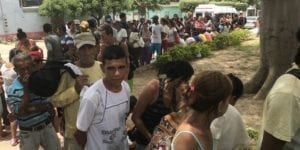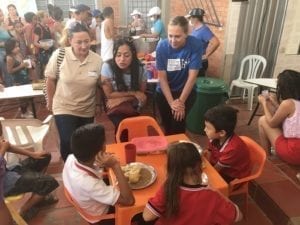
Food For The Poor is responding to a critical situation in Colombia, where tens of thousands of Venezuelan immigrants have fled to escape shortages of food, water and medicine.
A Food For The Poor team recently visited Cucuta, Colombia, with staff from longtime partner Feed My Starving Children and saw firsthand how aid is getting to desperate families.
Food For The Poor has shipped three tractor-trailer loads containing 450,000 MannaPack meals to the border city of Cucuta.
In one shelter, grateful people of all ages, including mothers with children, each received a bag filled with cooked MannaPack and a boiled egg, plus juice.
“We are often short of food and the MannaPack helps us to give more food to a greater number of people,” said Fr. Jaime Aparicio of the Catholic Diocese of Cucuta. “MannaPack also helps malnourished people due to its nutritional content.”
Families can stay in shelters from three to 10 days. Afterward, they are asked to leave to make room for more families. Because of the crushing demand and limited space, a growing number of people are sleeping at the bus terminal or other public places.
“If it wasn’t for this institution that we call Las Monjas (the Nuns), I would have had to return to Venezuela because I have not been able to find work,” said Adacel Atencio, who traveled to Cucuta from Maracaibo, Venezuela. “Here, we have breakfast, lunch and dinner every day.”
As the number of migrants continues to rise, the need for aid is growing.
“It was hard seeing families sleeping on the street, waiting for their turn for a shelter to open up, and going hungry,” said Cesar Guevara, International Operations Manager in Food For The Poor’s Gifts In Kind Department.
“They need to re-establish their dignity,” Guevara said. “They see themselves as having no dignity. They’re in a country that is not their country.”
Food For The Poor began serving in Colombia in 2014, working primarily with the Order of Malta, one of the oldest lay religious orders of the Catholic Church.
The Order of Malta is delivering MannaPack from the Colombian port city of Cartagena, where it must be loaded and hauled on trucks on a 10-hour, 450-mile journey through the mountains to Cucuta.
In Cucuta, MannaPack is stored in a food bank and distributed to 11 feeding centers, serving almost 8,000 people daily. MannaPack is a rice casserole meal of dried vegetables, vitamins and soy that can be cooked like rice. The meals are packed by volunteers at events around the United States hosted by Feed My Starving Children.

Jordyn Strege, Feed My Starving Children’s Regional Program Manager, said she had never seen so many people standing in line, waiting to receive a hot meal. One feeding center run by a partner of the Order of Malta, Strege said, serves 5,000 people between 11 a.m. and 3 p.m. every day.
“We saw many blank faces, people who I can imagine are just feeling numb,” Strege said. “But then we also witnessed the power of faith, and people believing in God’s plan and that they will get through this.”
An estimated 3.7 million Venezuelans have fled their country as its economy has collapsed, according to news reports. More than 1 million have settled in neighboring Colombia in what has been called the region’s worst humanitarian crisis in decades.
As many as 25,000 people a day from Venezuela pass through Cucuta, some only staying for a day to buy food and medicine to return to Venezuela, while others continue on foot for two weeks to Bucaramanga.
Initially, the immigrants were mostly men crossing the border looking for work or food and supplies to bring back to their families in Venezuela. Now, it’s entire families and mothers with children.
“We saw a lot of people who have no hope,” Guevara said. “They don’t know what is going to happen next.”
The speed at which the crisis escalated surprised the Cucuta community. But people want to help. Even those who do not have much volunteer their time to feed those streaming over the border.
“Seeing entire families and women and children suffering with a lack of food, water and shelter has been a burden on our hearts,” said Food For The Poor President/CEO Robin Mahfood. “The people crossing from Venezuela into Colombia are in desperate need of assistance. What we are seeing makes that even more urgent.”
Food For The Poor, one of the largest international relief and development organizations in the nation, does much more than feed millions of the hungry poor primarily in 17 countries of the Caribbean and Latin America. This interdenominational Christian ministry provides emergency relief assistance, clean water, medicine, educational materials, homes, support for orphaned or abandoned children, care for the aged, skills training and micro-enterprise development assistance. For more information, please visit www.FoodForThePoor.org.

Comments